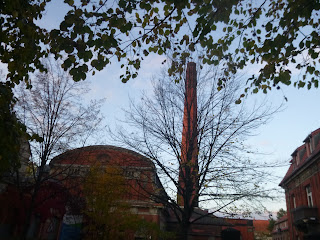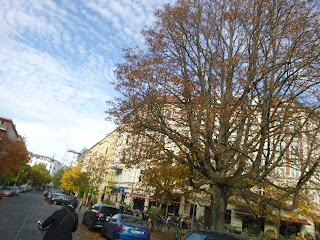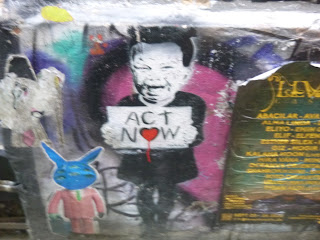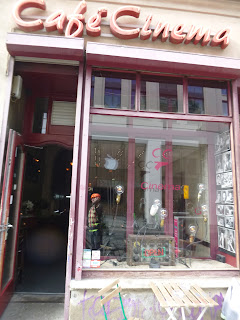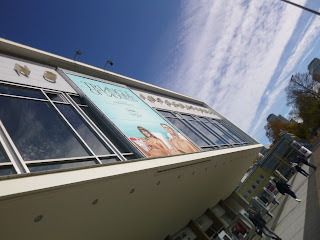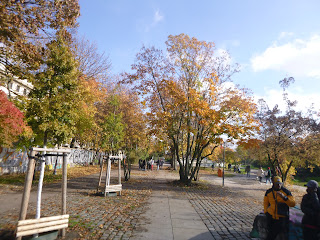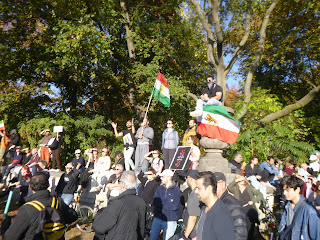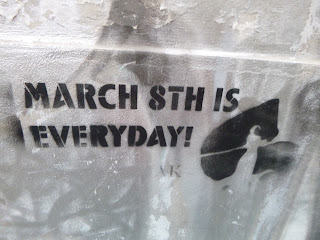On our way to Sejny, Poland, I heard about a favorite teacher, Dr Christine Eastus, who I knew for a decade in Dallas, although she was originally from Warsaw, who shuffled off. Such an influence in the hardest years, after grandad died and I literally flunked her class. And she stuck with me, tutored me at lunch time every day, class after class. Leading us through reading many of the best novels, Love in the Ruins, Aunt Julia, Unbearable Lightness of Being. Some of my favorite novels to this day, books who made me who I am, books I wrote about reading that changed my life. Wow. It's hard to say goodbye. Instead I'll say see you in the library in the forever. Odd about her demise traveling in Poland, all of us on the move.
Back in Berlin, we dug through it all, more art, more trips to art museums, the Hamburger Bahnhof, flea markets, strolled through the gorgeous fall, to the flo markets into an old church, Zionskirche being repaired. Bonhoeffer's church. People did speak up in the 1930’s, questioning ideas of docile obedience. Yet, they were killed for it.
Our new friend Monika Paulick showed us her work in the group show, 9 garden 9 fotigrafinnen 9 jahre at Verwalterhaus, our favorite cemetery and art gallery. The walls tell stories here, says monika. Agreed.
Yellow leaves and fall colors everywhere as we rode around exploring.
In between galleries, Caroline and I stopped for coffee at the dark and wonderful cafe at at Kino Central at Rosenthaler Str. 39. And scrolled through lists of movies. Caroline suggested we go see In a Land That No Longer Exists, a film about a model in 1989. “Aelrun Goette's film is inspired by her experiences in East Germany during the late 80s, when she worked as a fashion model.” It was playing at Kino International, from 1961 to 1963 on Karl-Marx-Allee in former East Berlin, an exquisite old theater. Like the old novels from that class long ago, the film pointed at the hard parts, the wonderful parts of living and growing up, taking your knocks and finding yourself.
That was the feeling all week, going to Moonage Daydream, the Bowie bio / montage at Cinema Moviemento, an arthouse Cinema with 3 auditoria plus a lounge, showing arthouse, classic & modern movies on Kottbusser Damm 22, in Kreuzberg, Berlin.
Hearing the Bowie voiceovers, watching the footage and performances of Bowie's journey, between here and there, my own montage flashed, to the soundtrack, the old Ziggie albums, growing up, playing football, playing those Bowie albums, finding friends, creating a world, stumbling into new worlds. Toward the end of the film, footage showed people dancing to Bowie’s “Memory of a Free Festival,” a song about a summer festival:
“The children of the summer's end gathered in the dampened grass
We played our songs and felt the London sky
Resting on our hands -- it was God's land..
Touch, we touched the very soul
Of holding each and every life
We claimed the very source of joy ran through…
Oh, to capture just one drop of all the ecstasy
That swept that afternoon…”
There are moments that stay and surprise and remind and cajole, as we find something.
“The sun machine is coming…”
Finishing the film, Kai and I talked about it all at Lenau Stuben, a neighborhood pub Hobrechtstraße 62.
I found myself wondering about all the dives I’d seen lately, Muller’s our favorite on Knaackstraße 14, and 8MM, the punk, techno bar Dodi showed me, the Lyric Cafe, where the klezmer plays, and Schmittz, the spot down the street.
In 1921, Joseph Roth wrote about his favorite dive bars here:
“The epicenter of the phenomenon known to us as the dive or joint is the Alexanderplatz station, from where it spreads over the east end of Berlin, and, from there, ultimately over to the rest of the world…. Cobblestones… as if if they had been lamposoists or some other organic outgrowth of the street - arise pimps and their prostitutes, and the police station, whose gates are already locked and guarded by a couple of Berlin’s finest … daydreaming…”
I guess we’re all daydreaming here, looking for something.
There is certainly a horror and hope here, intermingling, dancing shadows.
I thought of that on the tram, with my subway pass insufficient to prevent a fine.
Pulled off the train, I'd need to prove it had been authorized.
In the meantime, I'd need to pay a fine.
There are guards, asking for passports and papers. It's part of the life here, papers please. Gives me a chill. You wonder about the authority supporting personality here, with its deep deep roots in Frederick’s Berlin.
So, we look about and explore.
Monday was my first day in the sociology program at Freie Universitat.
Each day, more adventures in sociology. Certainly not that different than the USA. Subway stopped for 25 because of a passenger emergency so I had to walk to my subway transfer. Got to the room. Found other sociology students there. We sat for a half hour at the classroom on the catalog, till someone said the class was in the lecture hall across the campus, a subway ride away. Got there just in time for the sociology lecture on what is sociological theory. And ways to interpret theoretical norms. I was puzzled with the question about normative ideas. Based on what, epistemology? Lots of social norms in Germany, many based on ideas of conformity. Obey authority. Wear black at clubs. The church must follow the state, etc. Seemed odd.... Still exhausting and fun. Chatted with students afterward. And made my way back.
“No borders,” declares the black writing on the bathroom in the sociology building my second day, as the adventure in sociology continues. Lots of deja vu. If you were there the first time don't flash forward says my dissertation advisor. Rainy morning, I spilled my coffee in my bag. Went to European Integration and Multiculturalism, both taught by white men. Good esprit de corps. A few students from Istanbul invited me out to lunch at the dining hall, where we talked and talked... NATO, anticapitalism, socialism, etc. And made my way back home.
After social movements class on Friday, I stopped for pint. And a German man started yelling at me that I was a "McFonaldsschnops..." I agreed with him and toasted him. I agree no one wants more Americans here. And 80 years ago the Poles felt the same way about the Germans. They came. Many left. Caroline’s mom left for the states. And we came back. This is an immigrant town. Lots of overlapping histories. At class, two professors got in a quarrel about class. And whose class it was. Political economy or social movements. The students voted for social movements.
I always think of the 400 Blows of childhood, the cruelties, the escape, onward, backward, black and white images of old movies.
After class, a funny night to catch into it all at Mullers, Friday. Up till late chatting with Federico and Emily and Caroline.
Demo for Women, Life,and Freedom on Saturday....a bike ride to a huge demo, friends in town from the states, funny djs at @8mmbar, bad hair @schmittzberlin, an old-style watering hole with a graffiti-covered facade on Torstrasse, before heading out for other adventures along the way, between Kreuzberg, a dark park, a strange path along the river, and back home.
Sunday art shows on Women on the Move:
“Eastern Europe between tradition and action
Femen in Ukraine, Pussy Riot in Russia, the Women’s Marches 2020 in Belarus, as well as the struggles against the abortion paragraph in Poland: something is happening in Eastern Europe. For years, women have been drawing attention to themselves with political protests and highprofile actions. They are perceived internationally as political actors and publicly break the traditional clichés of women as workers, mothers or sex objects.
Women in Eastern Europe have their own socialisation history: for more than forty years they were considered equal under communism – but usually the sole responsibility for housework and child rearing was added to the gainful employment. Strongly defined gender roles in everyday life seem to be incompatible with the self-image of a new generation of women. The stereotypes are shaking today, at least they are in motion. How do these women see themselves? How do we see them? In Women on the Move, nine female photographers take a differentiated look at the current situation and the historical legacy of women in Eastern Europe: Belarus has one of the highest abortion rates in the world, yet they remain taboo. Tatsiana Tkachova met women who have had abortions; they tell of violence in marriage, abuse, fear and financial difficulties. In Poland, thousands are taking to the streets against the tightening of the abortion law. Agata Szymanska examines the eroding situation of the rule of law in Poland and the repression of critical judges. Violetta Savchits documented women’s resistance to the rigged presidential election in Belarus in 2020 before it was silenced. Criticised, tortured and persecuted, this is also part of the story of the group Femen founded in Kiev. Justyna Mielnikiewicz portrayed the women’s rights activists who have been demonstrating unclothed for women's rights for more than a decade. Photographs by the Ukrainian artist Elena Subach deal with the generation of grandmothers. With handbags and traditional, colourful headscarves, her photographs encourage reflection on the gap between generations. A collaboration between the artist Alicja Rogalska and the Hungarian Women’s Choir of Kartal resulted in the award winning video work News Medley. It impressively combines traditional folk tunes with contemporary texts. Natalia Kepesz deals with collective memories and their visual realisation: Her grandmother ran away from home to fight in the Second World War. In 1945 she sent a photo from the front. On the back she wrote: Let this dead photograph reminds you of me alive. Maria Kapajeva’s video work deconstructs the Soviet propaganda film The Bright Way (Alexandrov, 1940). In the current Russian war of aggression, international attention is focused on Oksana Parafeniuk’s homeland, Ukraine. Her photographs tell of life between war and everyday life.”
After the show, we meandered to Cafe Kotti, perhaps my favorite of the dive bars, to unpack it all, the rightwing tilt in Italy, the marches for women in Iran, Women’s Marches, abortion restrictions, the Nationalist rallies right outside our door, and ongoing struggles for democracy in the world.
The teenager and I watched Unbearable Lightness of Being, a movie I saw, after reading the book on that class, from the spring of 1988, remembering history change in front of our eyes.
And met Emily for a final catch up, a fun night @8mmbar dancing, watching old DavidLynch and Tarantino movies, Death Proof, chatting about NYC and Berlin with an NYC friend @emschuch, as the DJ spun the records and more and more of us stood up to dance, like that old Bowie song. The sun machine is coming…

































































